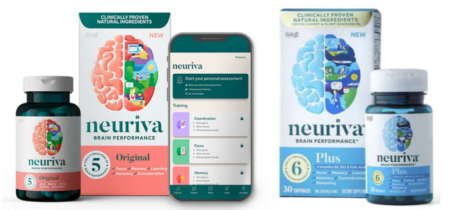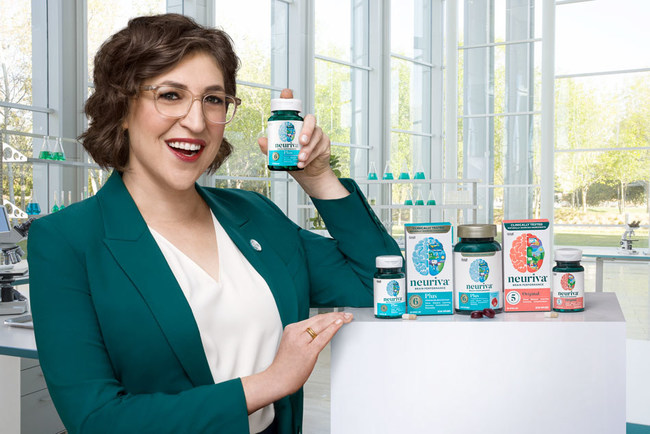Mayim Bialik, who was named Wednesday as the new co-host of Jeopardy, had as recently as a few weeks ago promoted Neuriva as a science-backed product, despite the fact that its manufacturer was forced to withdraw claims that the supplement is science and clinically proven.
The Big Bang Theory star and self-acclaimed neuroscientist, put her reputation on the line by personally vouching for the supplement’s disproved claims.
Bialik is talented and brilliant and she also has a doctorate degree in neuroscience. However, as one of our readers – David Dax – points out, there is no evidence she actually worked as a scientist, calling into question her claim of being a neuroscientist. It’s sort of like claiming to be a teacher when you have a degree in education but never actually taught.
In her advertising videos, Bialik said she had “personally vetted” the supplement and found it the best of all so-called brain boosters. She said she is taking it as part of her daily health regimen.
“Neuriva is a key element in Mayim’s brain health routine, along with simple lifestyle choices, like a balanced diet, supplementation, sleep hygiene, physical exercise and an active social life,” the company said in its press releases.
Her endorsement continued for weeks after the manufacturer agreed to stop making its fabricated claims. More recently her new television commercials no longer include scientific claims nor of her claiming that she personally researched it.
The agreement is part of an out of court settlement by Reckitt Benckiser LLC – manufacturers of Neuriva – and plaintiffs, agreeing to a $8 million deal stipulating the companies would stop marketing the products as being proven by science to improve brain performance. The settlement received preliminary approval by a federal judge in Florida on April 23.
While denying that it falsely advertised its products, the manufacturer agreed to change its marketing claims. It has agreed to limit its advertising claims to terms such as “clinically tested” and “science tested.”
Under the stipulated agreement signed in April, the company can still make its false claims until six month after a federal judge gives final approval, which is expected to take place later this month.
The ban on the marketing claims will last for two years. The manufacturer can meanwhile attempt to provide scientific proof of any new claims.
The settlement provides for up to $65 payments to those who have proof they purchased the products and $20 for those who do not have proof. The tentative due date to file is by Oct. 1.
Claims may be filed here. Lawyers representing the plaintiffs are seeking $2.9 million for fees and expenses.
Prevagen Also Made Up False Claims
The Neuriva settlement follows a similar agreement last year between consumers and Quincy Bioscience’s Prevagen products that resulted in the company having to pay out $36 million.
The class action lawsuit claimed that the company falsely claimed that its products are “clinically shown to improve memory.”
The manufacturer is also facing suits from the Federal Trade Commission and the New York Attorney General over false advertising claims.
Nevertheless, Bialik is wading into the controversy by personally vouching for a product that has no proof of helping consumers.
yes, I checked it myself
“After studying neuroscience for 12 years, I’ve learned a lot about the brain, so anything that can help support the brain is something I’m passionate about,” said Bialik in a company March 16 press release.
“I’m excited to kick off my partnership with Neuriva because I’ve never actually found a brain health supplement I believed in – until now. Neuriva Plus is backed by strong science – yes, I checked it myself – and it combines two clinically tested ingredients that help support six key indicators of brain health.*
“I’m looking forward to educating others about the science behind Neuriva because supplements are truly not all created equally. My hope is to inspire others to do more for their brain through a holistic approach and incorporate Neuriva into their daily health routine, just like it’s become part of mine.”
In her May 6 commercial, she still insisted it was “backed by real science.”
Jeopardy Co-Host Mayim Bialik Promoted Fake Brain Supplement Neuriva
In her research, she might have overlooked a March 27, 2020 article in Psychology Today by Gary L. Wenk, Ph.D. Author of Your Brain on Food.
He called it snake oil.
“Move over sellers of last year’s miracle brain enhancer, Prevagen, there’s a new snake oil salesman in town. Neuriva is all the rage now thanks to slick marketing campaigns by Schiff Vitamins who have made lots of money selling other useless products, such as Airborne,” he wrote.
Gary L. Wenk, Ph.D., is a professor of psychology, neuroscience, molecular virology, immunology and medical genetics at the Ohio State University.
Despite the fact that Neuriva’s manufacturer has conceded that there is no scientific proof that Neuriva Original and Neuriva Plus brain supplements’ ingredients boost brain power, the company is still making the false claims.
Neuriva is being sold on Amazon and by other retailers claiming its wonderful ingredients are “clinically proven” to boost your brain power:
“CLINICALLY PROVEN NATURALLY SOURCED INGREDIENTS: Clinical studies have shown that coffee cherry (neurofactor) and plant-sourced PS (phosphatidylserine) have a positive effect on brain performance.”
In their initial suit, lawyers for the plaintiffs said:
“The highly trumpeted active ingredients in Neuriva are Coffee Cherry Extract (also called “Neurofactor”) and Soy-based Sharp PS (Phosphatidylserine), both of which Defendants state are “clinically proven to enhance brain performance.”
“In reality, Defendants have no scientific or clinical proof that Neuriva provides any benefit to the brain or that its key advertised ingredients can actually access the brain in sufficient amounts—or in any amount—to provide meaningful brain performance benefit. Defendants’ promises about Neuriva and their representations about Neuriva’s key ingredients are simply false or, in some instances, disturbingly misleading.”
In its press release, Neuriva explains “
About Neuriva
Named from the Greek word for ‘Brain’ and the Latin word for ‘Life,’ Neuriva combines the best of science and nature to help brains think bigger. Neuriva is more than a supplement; it’s a brain-healthy lifestyle. Its holistic approach incorporates an ecosystem of digital assessments, brain-sharpening exercises and education. When they created Neuriva, they thought bigger so you can too.”

Eat Berries Instead
Instead of paying $65 a month to be part of the $4 billion market for bogus brain supplements, eat berries.
Consumer Reports suggests a cup of berries a day will improve your memory and overall health. If fresh berries are out of season you can buy them frozen.
“Blueberries, strawberries, and raspberries are also powerful foods for learning and memory, says Barbara Shukitt-Hale, PhD, a neuroscientist at the Jean Mayer USDA Human Nutrition Research Center on Aging at Tufts University in Boston.
“According to a 20-year Harvard study of women 70 and older, eating blueberries at least once a week or strawberries at least twice a week may delay cognitive aging by up to two-and-a-half years. And in Shukitt-Hale’s research, older men and women who ate the equivalent of 1 cup of fresh blueberries every day for three months did better on learning and memory tests than those who were given a placebo. Ongoing research suggests that strawberries and raspberries may have similar benefits, she says.”



She isn’t a neuroscientist until she actually practices neuroscience rather than declaring herself to be one in TV commercials. She did get her Ph.D. after writing a paper, but she remains a TV personality.
Agreed. Jeopardy should drop her as a host. She is deceiving the American public by her sponsorship of a so called “brain enhancer’. The product has already lost a case in court.
David Dax, you have no clue what it takes to obtain a PhD, lol!!! How many years were you in school to get your PhD? I am so tired of everyday dudes and dudettes declaring themselves experts in areas in which they have zero understanding. Zero. That’s as bad as Bialik hawking fake brain tonic. The minute you finish your PhD , you are a member of that field. You contributed your dissertation to the field, a large document that can take many years of original research to complete. However, you are not ‘practitioner’ in that field, if you are not actively publishing/speaking about original research validated by colleagues, or working for an entity as a member of that field.